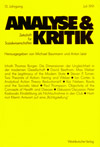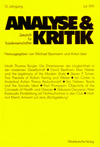Suchergebnisse
"Dieter Mans"
Titel: Künstliche Intelligenz in den Sozialwissenschaften. Expertensysteme als Instrumente der Einstellungsforschung
Autor: Michael Baurmann / Dieter Mans
Seite: 103-159
Abstract: INTERDAT is computer software which substitutes a human interviewer. INTERDAT asks questions and tries to understand the responses by attributing mental models to the interviewee. The correctness of these models is tested by forecasting the responses to new questions. INTERDAT has many possibilities to adapt its models till it reaches the desired degree of understanding. Technologically INTERDAT is an Artificial Intelligence programme which is written entirely in LISP and to our knowledge the first AI application in sociological research.
Titel: Soziologische Kausalanalyse. Eine Betrachtung aus gro ßer Distanz
Autor: Dieter Mans
Seite: 154-194
Abstract: Is causal analysis an appropriate method to discover causal laws? Some prerequisites for any successful application of mathematical causal models are worked out and discussed. It can be shown that these prerequisites cannot be fulfilled by present models and there are strong reasons to assume that they cannot be satisfied by any model. Therefore causal analysis will probably be of no importance for the discovery of causal laws in sociology.
Titel: Zum Programm einer kritischen Sozialwissenschaft - Theorie der gerechten Gesellschaft und Ideologiekritik
Autor: Michael Baurmann / Anton Leist / Dieter Mans
Seite: 105-124
Abstract: Critical social science has to acknowledge that every fundamental critique of society implies the justification of alternative norms and institutions. Several current objections against such an explicitly normative understanding of critical social science are discussed. The following outline of a theory of a just society tries co meet two demands: the rational consensus of all individuals concerned and the satisfaction of individual interests. In societies characterized by class struggles, however, these two aims turn out co be incompatible. Therefore an ethical realist approach is offered which takes into account the clarification and normative reinterpretation of interests. The tools of analytic philosophy can be given new application in combina-tion with an analysis of interests under the title of a critique of ideology.
Titel: Zum Programm einer kritischen Sozialwissenschaft - Empirie und Theorie
Autor: Michael Baurmann / Anton Leist / Dieter Mans
Seite: 1-29
Abstract: The article argues for a synthesis between analytical philosophy and social sciences as relevant and necessary. The motivation and framework of such a synthesis is outlined on the basis of a critical social science. The authors illuminate such a perspective negatively in a critique of empirical and theoretical sociology, then positively in a clarification of the critical standpoint. Four theses, two under each aspect, are defended: 1. Concerning empirical social sciences: Neither the quantitative nor the qualitative paradigm of empirical social science is able to put forward adequate methods for social research. Instead, the development of reconstructive methods is proposed to combine the advantages and eliminate the disadvantages of the quantitative and qualitative paradigms. 2. Concerning theoretical sociology: Macrosociological theories tend to resist empirical corrobation. Pure theoretical and philosophical justification abounds instead. In this situation the tools of analytic theory of science are proposed in order to c1arify the necessary steps towards a further development of theories, which can be empirically tested. 3. Concerning the critique of society: A critical social science must incorporate a theory of a just society in order to analyse social institutions in a normative way. In this context an ethical realist approach is offered which tries to fulfil two conditions for sociologically relevant normative reasonings: satisfaction of individual interests and the rational consensus of all persons concerned. 4. Concerning critique of ideology: The tools of analytic philosophy can be given new application by combining them with an ana-lysis of interests under the tide of critique of ideology.

James S. Coleman's Foundations of Social Theory II
1993 (15) Heft 1
Editorial
In ANALYSE & KRITIK 2/92 wurde mit Beiträgen von Hartmut Esser, Karl-Dieter Opp, Russell Hardin, Norman Braun, Werner Raub, Dennis C Mueller und Peter Kappelhoff ein Symposium zu James S. Colemans vielbeachteten Buch Foundations of Social Theory eröffnet. In dem vorliegenden Heft wird dieses Symposium mit Beiträgen von Peter M. Blau, Raimo Tuomela, Andreas Diekmann, Michael Baurmann sowie einer Erwiderung von James S. Coleman weitergeführt. Ein Aufsatz von Michael Taylor wurde zwar nicht als...

James S. Coleman's "Foundations of Social Theory" I
1992 (14) Heft 2
Editorial
James S. Colemans "Foundations of Social Theory" werden in ihrer Bedeutung für die Sozialwissenschaften von manchen mit Talcott Parsons' "Structure of Social Action" verglichen. Während jedoch Parsons mit seiner ,voluntaristischen Handlungstheorie, ein neues Paradigma für die Soziologie begründen wollte, stützt sich Coleman auf die ökonomische Theorie rationalen Handelns, die auch in der Soziologie bereits eine Forschungstradition hat. Anstatt eine grundsätzliche Neuerung in die Wege zu l...